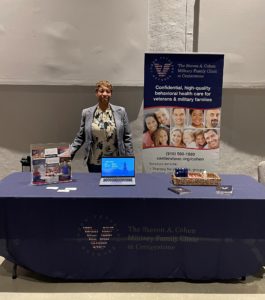Understanding the Why: Access
In an earlier BIPOC Mental Health Awareness Month Blog, we captured who this month acknowledges, but it is important to understand why the awareness month is needed. In many ways, it comes down access.
Every year millions of Americans are faced with the reality of living with a mental health condition. These conditions do not discriminate based on race, color, gender or identity, and anyone can experience the challenges of mental illness regardless of their background. However, a person’s background and identity can make access to mental health care much more difficult to obtain.
For BIPOC, barriers to mental health care access may include: insurance coverage, cost of treatment, language, prejudice and discrimination, cultural stigmas, having transportation and even one’s geographic location.

Breaking Down Barriers Through Outreach
At our Steven A. Cohen Military Family Clinics, reducing barriers to mental health care treatment is at the heart of everything we do. This includes our outreach work to break down walls and build bridges in the community we serve.
Outreach Director, Sharjuan Burgos, of our Cohen Clinic at Centerstone in Fayetteville, NC, recently had the opportunity to participate in one such outreach event, Fayetteville-Cumberland County’s Operation Ceasefire Movie Night at Manna Church.
Operation Ceasefire is a community movement to bring agencies and leaders together to “improve the quality of life for all residents of Fayetteville-Cumberland County by reducing gun and gang violence.”
Movie goers were treated to FREE popcorn and drinks, a screening of Angry Birds and access to information on community services, including our Cohen Clinic at Centerstone.
“The opportunity to connect with citizens of so many backgrounds in our community in this kind of relaxed setting is not only fun, but also a great way to break down communications barriers and educate the public that our clinic is here to support them in their mental health care,” says Burgos.
She continues, “It’s about meeting people where they are, and that’s what our clinic tries to do with every outreach event we participate in.”
This blog was originally posted by our Fayetteville Cohen Clinic for Centerstone.org. Read the original post here.
By Alecia Blair
CVN Manager, Clinic Communications
